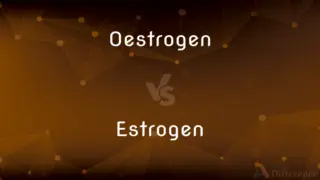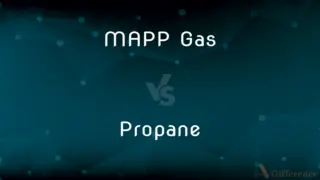Fleece vs. Sherpa — What's the Difference?
By Tayyaba Rehman — Updated on October 11, 2023
Fleece is a soft fabric made from synthetic materials, while Sherpa is a plush, wool-like fabric resembling sheep's wool.

Difference Between Fleece and Sherpa
Table of Contents
ADVERTISEMENT
Key Differences
Fleece is a lightweight, synthetic fabric known for its warmth and softness. Sherpa, on the other hand, is a textured fabric designed to mimic the appearance and feel of real sheep's wool, with its dense and fluffy texture.
Both Fleece and Sherpa are popular materials for cold-weather clothing. While Fleece provides warmth without adding much weight, Sherpa offers an extra layer of insulation due to its thick pile.
The production of Fleece primarily involves the use of polyester, making it durable and resistant to moisture. Sherpa, while it can also be made from synthetic materials, is distinguished by its bumpy texture reminiscent of a sheep's fleece.
In terms of maintenance, both Fleece and Sherpa require care to maintain their softness. However, Fleece generally pills less and retains its shape better over time compared to Sherpa, which may mat down with frequent use.
Aesthetically, garments with Fleece often have a smooth appearance, while those made with Sherpa have a more rustic, textured look due to the fabric's woolly and fluffy nature.
ADVERTISEMENT
Comparison Chart
Material
Synthetic, mainly polyester
Often synthetic, wool-like
Texture
Smooth, soft
Fluffy, bumpy
Warmth
Warm
Very warm
Appearance
Smooth finish
Textured, woolly look
Durability & Maintenance
Resistant to pilling, retains shape
May mat with use, requires care
Compare with Definitions
Fleece
The woolly covering of a sheep.
The farmer sheared the Fleece from the sheep.
Sherpa
A fabric resembling sheep's wool.
The Sherpa lining in her coat kept her toasty.
Fleece
A material known for its warmth without weight.
I prefer Fleece blankets during mild winters.
Sherpa
An ethnic group from Nepal known for mountain guiding.
Tenzing Norgay, a Sherpa, co-climbed Mount Everest with Sir Edmund Hillary.
Fleece
The woolly covering of a sheep or goat
He clutched the ram by two handfuls of thick fleece
As the sheep came on board, we grabbed their long shaggy fleeces
Sherpa
A fabric used for its insulating properties.
Sherpa-lined boots are a must in cold climates.
Fleece
A soft warm fabric with a texture similar to sheep's wool, used as a lining material
A reversible fleece jacket
Sherpa
A term referring to the characteristic bumpy texture of certain fabrics.
Her new hoodie has a Sherpa feel to it.
Fleece
Obtain a great deal of money from (someone), typically by overcharging or swindling them
The city's cab drivers are notorious for fixing fares and fleecing tourists
Sherpa
A plush, textured material.
The Sherpa throw on the couch is her favorite blanket.
Fleece
Cover as if with a fleece
The sky was half blue, half fleeced with white clouds
Sherpa
A member of a Himalayan people living on the borders of Nepal and Tibet, renowned for their skill in mountaineering.
Fleece
The coat of wool of a sheep or similar animal.
Sherpa
A member of a traditionally Buddhist people of Tibetan ancestry living on the southern side of the Himalaya Mountains in Nepal and the Indian state of Sikkim. In modern times Sherpas have achieved renown as high-altitude porters and expert guides on Himalayan mountaineering expeditions.
Fleece
The yield of wool shorn from a sheep at one time.
Sherpa
(countable) A local mountain guide or porter, particularly a male of the Nepalese Sherpa people so employed.
Fleece
A soft woolly covering or mass.
Sherpa
(countable) An expert accompanying a high-ranking leader to a summit meeting.
Fleece
A soft, warm, lightweight, usually synthetic fabric with a deep pile, used primarily for clothing and blankets.
Sherpa
A synthetic fabric with a long, thick pile, similar to faux fur, imitation lamb wool, or fleece.
Fleece
A garment, especially a shirt or jacket, made of such fabric.
Sherpa
(rare) To serve as a guide or porter for another.
Fleece
To defraud of money or property; swindle.
Sherpa
A member of the Himalayan people living in Nepal and Tibet who are famous for their skill as mountaineers
Fleece
To shear the fleece from.
Fleece
To cover with a fleece or similar covering.
Fleece
(uncountable) Hair or wool of a sheep or similar animal
Fleece
(uncountable) Insulating skin with the wool attached
Fleece
(countable) A textile similar to velvet, but with a longer pile that gives it a softness and a higher sheen.
Fleece
(countable) An insulating wooly jacket
Fleece
(roofing) Mat or felts composed of fibers, sometimes used as a membrane backer.
Fleece
Any soft woolly covering resembling a fleece.
Fleece
The fine web of cotton or wool removed by the doffing knife from the cylinder of a carding machine.
Fleece
(transitive) To con or trick (someone) out of money.
Fleece
(transitive) To shear the fleece from (a sheep or other animal).
During spring shearing we have to fleece all the sheep in just a few days.
Fleece
(transitive) To cover with, or as if with, wool.
Fleece
The entire coat of wool that covers a sheep or other similar animal; also, the quantity shorn from a sheep, or animal, at one time.
Who shore meLike a tame wether, all my precious fleece.
Fleece
Any soft woolly covering resembling a fleece.
Fleece
The fine web of cotton or wool removed by the doffing knife from the cylinder of a carding machine.
Fleece
To deprive of a fleece, or natural covering of wool.
Fleece
To strip of money or other property unjustly, especially by trickery or fraud; to bring to straits by oppressions and exactions.
Whilst pope and prince shared the wool betwixt them, the people were finely fleeced.
Fleece
To spread over as with wool.
Fleece
The wool of a sheep or similar animal
Fleece
Tanned skin of a sheep with the fleece left on; used for clothing
Fleece
A soft bulky fabric with deep pile; used chiefly for clothing
Fleece
Outer coat of especially sheep and yaks
Fleece
Rip off; ask an unreasonable price
Fleece
Shear the wool from;
Shear sheep
Fleece
A soft synthetic fabric.
Her jacket is made of Fleece to keep her warm.
Fleece
A fabric resistant to moisture.
Fleece activewear is ideal for outdoor workouts.
Fleece
A versatile textile used in clothing and bedding.
He bought a Fleece-lined sleeping bag for camping.
Common Curiosities
And what is Sherpa?
Sherpa is a wool-like fabric designed to resemble real sheep's wool.
Does Sherpa look like real sheep's wool?
Yes, Sherpa is designed to mimic the appearance and texture of sheep's wool.
Is Fleece made from sheep's wool?
No, Fleece is mainly synthetic, although the name might suggest otherwise.
Which is warmer, Fleece or Sherpa?
While both are warm, Sherpa typically offers more insulation due to its thicker pile.
What is Fleece?
Fleece is a soft, lightweight synthetic fabric known for warmth.
What are common uses for Fleece?
Fleece is often used in jackets, activewear, blankets, and more.
Why is Fleece popular in activewear?
Fleece is lightweight, warm, and wicks away moisture, making it suitable for activewear.
Is Sherpa only a type of fabric?
No, Sherpa also refers to an ethnic group from Nepal known for mountain guiding.
Does Sherpa require special care when washing?
It's advisable to follow care labels, but generally, Sherpa needs gentle washing to maintain its texture.
Are Fleece and Sherpa eco-friendly?
Both can be made from recycled materials, but as synthetic fabrics, their production can have environmental impacts.
Where is Sherpa commonly found?
Sherpa is often used as lining for jackets, boots, and in plush blankets.
Can Fleece be used for summer clothing?
Lightweight Fleece can be used, but it's generally favored for cooler conditions.
Is Fleece moisture-resistant?
Yes, Fleece, especially when made from polyester, is resistant to moisture.
Do both Fleece and Sherpa come in different qualities?
Yes, the quality of both Fleece and Sherpa can vary based on the manufacturing process and materials used.
Why is Sherpa called Sherpa?
The fabric's name is inspired by its resemblance to the wool garments worn by the Sherpa people of Nepal.
Share Your Discovery

Previous Comparison
Electrocardiograph vs. Electrocardiogram
Next Comparison
Tight vs. HardAuthor Spotlight
Written by
Tayyaba RehmanTayyaba Rehman is a distinguished writer, currently serving as a primary contributor to askdifference.com. As a researcher in semantics and etymology, Tayyaba's passion for the complexity of languages and their distinctions has found a perfect home on the platform. Tayyaba delves into the intricacies of language, distinguishing between commonly confused words and phrases, thereby providing clarity for readers worldwide.















































